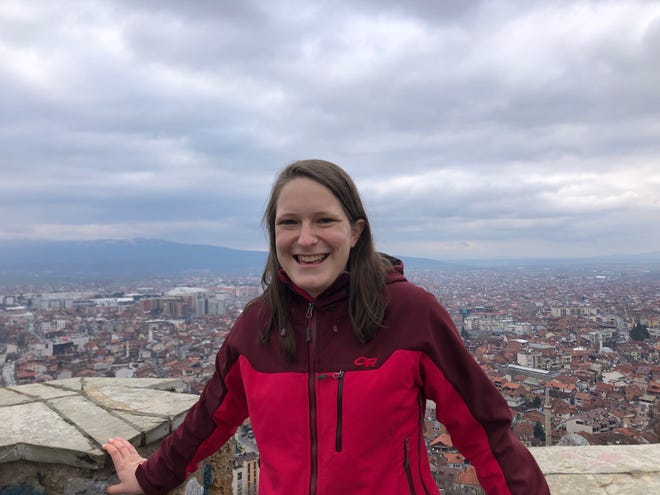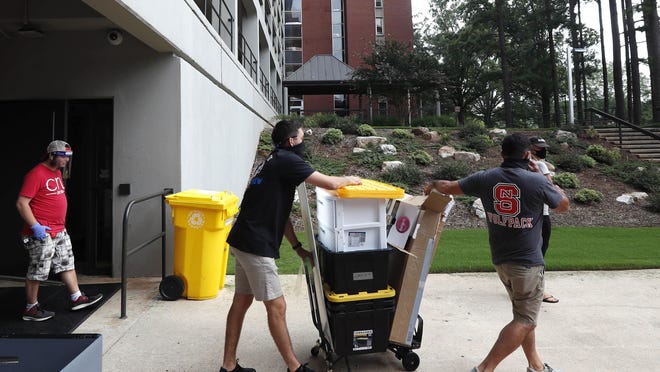
As the fall semester gets underway, college students are reuniting with their friends, getting (re)acquainted with the campus, and doing what college students often do: partying. But in the time of the coronavirus, as more parties surface university administrators have been quick to condemn — and even berate — the behavior of students.
"Be better. Be adults. Think of someone other than yourself," pleaded a letter to students at Syracuse University following a large gathering on campus.
"We are terribly disappointed," leaders at the College of Holy Cross wrote to students before remote classes had even started.
"This is the kind of reckless behavior that will put an end to our in-person semester, and it must stop," wrote the president of St. Olaf College, a small school in Minnesota after an off-campus party.
For many students, this scolding feels like a bait and switch: Didn't those university administrators, many of whom brought students back to campus knowing full well the challenges, share in some of that poor decision-making?
Students at The Daily Tar Heel, the student newspaper at the University of North Carolina at Chapel Hill, shared their thoughts about this when we visited their newsroom a week after that university moved its semester online, citing coronavirus clusters seeded by student parties.
"If the success of your plan relies on 18- to 24-year-olds being responsible, then maybe it's not a very good plan," says Anna Pogarcic, a senior at UNC and the editor-in-chief of the student newspaper. "The power dynamics of an 18-year-old versus this big university with its million-dollar endowment, you can't argue with that."
"I will give students a smidgen of the blame, just a smidgen of it," says Brandon Standley, a senior and managing editor at The Daily Tar Heel. "I think that the university gets the most blame because they brought back thousands of students."
"No one should be surprised," says Maydha Devarajan, a junior at UNC who spent the summer editing stories that challenged the university's plan to bring students to campus and hold in-person classes. "We've known this would happen all summer."
According to a UNC survey from early summer, 28% of undergrads said they were "extremely or somewhat likely to go to parties or other large campus gatherings." And colleges have been openly anticipating it. In July, the dean of students at Tulane University sent an email to students about behavior. In the third paragraph, in boldface and all caps, it said: "DO NOT HOST PARTIES OR GATHERINGS WITH MORE THAN 15 PEOPLE, INCLUDING THE HOST. IF YOU DO, YOU WILL FACE SUSPENSION OR EXPULSION FROM THE UNIVERSITY."
Fast-forward to late August, when many students returned to campus: Those parties and large gatherings happened, as expected. Across the country, from Tuscaloosa to Iowa City, students socialized — indoors with lots of people without masks — helped in part by many campuses' active Greek life.
"It breaks my heart to see this," says Anna Song, an assistant professor of health psychology at the University of California, Merced who studies decision-making by young adults. "It's like asking people to go on a diet. Putting them in a candy store and saying good luck. And then if they break that diet, we say, 'Why'd you break the diet? And, you know, we're going to punish you for it.' "
Many college students still have developing brains, so it's not that they aren't informed or that they don't understand the risks — it's that they're wired differently. "Peer networks and having a connection with other people is absolutely critical in terms of development for young people," Song says. "There is a lot going on in the brain to reward those kinds of interactions."
Of course, not all students are partying. Many are following the rules and encouraging others to do the same. "I'm not the only person that's frustrated," says Reagan Griffin Jr., a sophomore at the University of Southern California. He moved from Tennessee to Los Angeles to be closer to campus, despite the fact all his classes are online. He says he's been hunkered down, even though many of his fellow Trojans haven't been. USC reported an "alarming increase" in COVID-19 cases last week. "Clearly, other people have faulty priorities," he says. The case increases are "the fault of people who either don't know or don't care, and neither of those things is excusable."
Unlike other types of public health issues, the coronavirus is highly contagious, so the actions of a few can affect an entire campus. "With this kind of virus, you can't have 60% compliance and be like, 'Hey, we did a great job!' " says Song. "You need to have near-complete compliance for this to work."
She adds that university leaders must recognize what's driving behavior among their students. "You can't deny that the pull for social interaction is incredibly strong for this group; it's formative for them," Song says. "So asking them to deny that is a Herculean challenge."
In June, she raised an important question about asking students to refrain from partying when they head back to college: "Are we asking them to do something that is almost near impossible?" Now, she thinks the answer to that question is yes. "I do believe it's not fair to ask them to do this," she said this week.
With desperate pleas and social contracts failing to curb these events, some schools have turned to punitive measures. At several campuses, including Syracuse University in New York and Purdue University in Indiana, students have been suspended for attending and hosting large gatherings. In Chapel Hill, town officials charged students with misdemeanors in connection with off-campus parties at UNC. At the University of Connecticut, students were kicked out of on-campus housing for hosting a party in their dorm room.
"We know to shame and blaming people for public health interventions doesn't work, whether you're talking about sexually transmitted diseases or you're talking about drug use and drinking," explains Dr. Celine Gounder, an infectious disease physician, and public health expert. "You never want to do something that will drive behavior underground and make it riskier."But will this harsher approach work? Public health experts aren't convinced.
Song agrees. "My first thought was I bet what some students will think is 'Well, then I just can't get caught,' " she says. "So it becomes a game."
She's hopeful that enforcement from other students might be more successful than punitive messaging since young adults value peer connection.
"The best hope is that the students are vigilant with each other," she says, "because it's coming from a peer who's saying, 'You are hurting me, you are hurting our community and as a member, as your peer, as a person in your social network, I am not standing for that.' And I think that probably weighs more than everything else."
Alternative options
Another important aspect of regulating behavior is providing alternative programming. "We have to figure out how to help students meet some of those socialization needs, but in a safe way," Song says. Offering outdoor, socially distant activities, she says, will help schools "fare way better than just to say, 'Hey, just don't party.' "
Figuring out what a social life looks like on a college campus is Connie Carson's job at Furman University, a liberal arts college in Greenville, S.C. As the school's vice president for student life, she has leaned heavily on student organizations during the coronavirus pandemic.
"They are the lifeblood of any campus," she says. "Students are so much more creative, honestly, than we are." She points to a recent outdoor movie shown on the Furman campus, where students used hula hoops to enforce social distancing.
The school is working on ways to use outdoor venues to have "appropriate gatherings" such as trivia nights or dance parties to keep students on the grounds, rather than having them tempted to head off-campus, to downtown Greenville.
This responsibility sits firmly on the shoulders of the college, not the students, says David Paltiel, a professor at Yale who studies public health policy. "As the university, you've got the responsibility to provide students with imaginative, compassionate, realistic, low-risk options for staying socially connected," he says. Administrators need to be upfront with students about the challenge they're facing with enforcing student behavior, he says, and some infractions may be worse than others.
Paltiel isn't expecting administrators to actually know what's cool; that's why he says involving students, especially those involved with fraternities and sororities, is essential. He suggests this script for administrators, who are being upfront with students: " 'Here's the money. Here's the party tent. Here are the outdoor space heaters. Here are the pigs in a blanket. Here's the keg. What I can't have you doing is having these things indoors, unmasked. I can't have too many people in a single space.'""If you have to turn a blind eye to a game of beer pong that is happening on the quad or in a driveway, that's well worth it," says Paltiel. "What you're trying to prevent is the superspreader event where 150 unmasked kids get way too close to each other in the basement of some frat house with no windows open. That's what you're trying to prevent."
And remember, he says, what schools are asking students to do is hard, so a bit of empathy and compassion can go a long way. It hasn't been easy for many adults either.
Sweaty, drunken revelers spilled into the street below Addy Miller’s campus-adjacent apartment on Saturday after North Carolina State University’s first week of classes.
Miller, 20, viewed the late-night ruckus from her balcony, and others like it via news articles and viral videos. The locations vary, but the images are the same: throngs of college students partying like it’s 2019 – nary a mask in sight.
For Miller and her social circle, college is the time of coronavirus is an entirely different experience from the one playing out in news headlines. She and her friends wear masks outside their apartments – and sometimes inside – at small, socially distanced gatherings.
Miller’s only face-to-face interactions are with friends she’s certain are taking COVID-19 safety precautions seriously, she said, though a stranger scanning her Snapchat stories might jump to different conclusions. She suspects many college students, like her, may feel misrepresented.

“I think more people are being responsible on campus than the media is portraying,” said Miller, a communication major and TV and film actress with an extensive IMDb bio. “People don’t know the measures you took to make sure you’re safe. It’s really easy right now to shame and blame people.”
Though sizable student gatherings have spawned COVID-19 outbreaks on campuses nationwide, experts said chastising students for socializing is harmful, ineffective and fails to consider students’ developmental needs.
People go to college not only for education but to seek social connections, become independent and explore their identity – all of which are rather difficult to do over Zoom, said Mary Alvord, a psychologist who specializes in treating adolescents.
“We can't put all the blame on the college students; it’s a shared responsibility and the adults in charge need to understand developmentally where these students are coming from and their expectations beyond academics,” said Alvord, an adjunct professor of psychiatry and behavioral sciences at George Washington University. “Validate how tough this is.”
College administrators may not have received the message.
Syracuse officials suspended 23 freshmen for gathering on school grounds and said in a statement that students “selfishly jeopardized the very thing so many of you claim to want from Syracuse University – that is, a chance at a residential collegiate experience. … Be adults. Think of someone other than yourself.”
After discovering gatherings that didn’t meet school guidelines, the University of Connecticut officials evicted an undisclosed number of students from on-campus housing. Purdue suspended 36, although officials walked back most of them. The University of Tennessee threatened to expel students who host parties.
The list goes on. And on. And on.
North Carolina State announced Wednesday it would close residence halls less then a week after moving classes online, citing COVID-19 clusters in on- and off-campus housing. Nearly 800 students have tested positive since the pandemic began, most of them in August, according to the school’s website.
Miller said she understands the decision to close dorms. She had only one in-person class, but many of the students in that group were involved in Greek life.
“I was a little nervous, thinking, ‘What if I’m going to class with people who have been going to big parties?’ ” Miller said. “You have to trust they’re all taking the same precautions you are and that they’re thinking of other people. You just have to hope for the best.”
The ‘age of exploration’
At a cursory glance, the math may seem simple: Partygoers become positive cases, recklessness results in sickness, socializing equals selfishness.
Not quite, Alvord said. It’s a bit more nuanced than that.
Students hail from diverse backgrounds and belief systems. Some may have spent the summer with immunocompromised family members; others’ parents could have convinced them the virus is a hoax.
Some students are physically healthy but suffer from mental illness. “The risk of being alone or disconnected feels greater to them than the risk of contracting or spreading the disease,” Alvord said.
College students are in a developmental stage she describes as the “age of exploration.”
They feel young, invulnerable. Social engagement and acceptance are of utmost importance to them. “They want to be cool, to fit in, to belong – and that often supersedes perceived risk,” Alvord said.
Blame-and-shame tactics, though intended to target and tame a few bad actors, may have the opposite effect. When mask-free meetups make headlines, it proliferates the perception that everybody’s partying, so, to borrow a line from The Cranberries, why can’t we?
“You can't expect students to come back to campus, be locked in their rooms, not talk to anyone and eat all their meals by themselves,” said Hannah Lang, 20, a quantitative social science major at Dartmouth University. “At that point, it’s just not a campus experience at all.”

Students do have a responsibility to follow public health guidelines, and laying the blame solely at universities’ feet would deprive students of their the agency, Lang said. Even so, she said, her school’s reopening plans suffer from a major flaw: “None of them included student buy-in or asked students how they were planning to behave or what challenges they might encounter.”
Administrators at Beloit College in Wisconsin addressed the dissonance by asking students to rewrite the school’s Student Statement of Culture for the coronavirus era.
The student committee started with a conversation about how and where people would party rather than pretending they wouldn’t.
“Telling college students, especially ones who have been living in their parents' houses for five months, not to party or not to leave the dorm is unrealistic,” said Seva Poitevin, 21, a student government member. “Putting a ban on everything would encourage clandestine parties that wouldn't be safe. They’d be completely unregulated, inside and very secretive – and that’s what we’re trying to get away from.”

The guidelines the committee crafted included recommendations for health-conscious hugs, which members turned into an infographic and printed on signs they posted around campus.
“It’s not about not doing things – not hugging, not partying, not seeing friends – it’s about how to do them safely,” Poitevin said.
Administrators ponied up for circus tents, patio heaters, picnic tables, and Adirondack chairs to make the campus’ outdoor spaces more inviting, said Tara Girard, director of Beloit’s health and wellness center and a registered nurse.
“There are things as 20-year-old humans that they’re going to do, so it’s about how you educate them,” Girard said. “It’s harm reduction, not ‘just say no.’ ”

‘Confusing optics’
Lang led a research team at Dartmouth that delved into coronavirus concerns on campus. Students responding to the survey said they felt the school’s rules were unclear. Freshmen feared if they made one mistake, they’d be sent home and blamed if administrators tightened restrictions.
Lang said one of the issues the team tackled was how to address tiny transgressions. Perhaps behavior could be assessed on a sliding scale of egregiousness. Disregarding social distance guidelines by seeking comfort in a hug is not the same as throwing a massive, mask-free rager.
“You have the rule-followers who are really stressed about doing a single thing wrong because they may be sent home or expelled and none of the adults will trust them anymore, versus students who have given up and say, ‘Whatever, clearly this will all go wrong anyway, so I might as well do whatever I want,’ ” Lang said.
She said the latter group is a small subset of her generation and reports of students partying in her community may not be exactly what they seem.
Many students she knows live in five-person apartments and have selected one other apartment’s residents to socialize with. A social media post or news photo of 10 people partying outside, playing beer pong or cornhole without masks, might induce some undeserved eye rolls.
“It creates some confusing optics,” Lang said. “It’s being written about in the newspapers like we’re all completely out of control.”
Though Syracuse officials said hundreds of freshmen who gathered on the school grounds Aug. 19 “may have done enough damage to shut down the campus,” news reports indicated that all in attendance had tested negative before the event.

As Miller recalled the stream of students filling the street below her apartment, she didn’t condone their choices, but she does understand them.
She was home-schooled as a child, so she could pursue acting. She has twice portrayed a zombie in “The Walking Dead” and plays the lead role in “Behind You,” a horror film recently released on Hulu.
“I missed out on a lot of my childhood,” Miller said. “I don’t want to miss out on college.”
As parents across the United States come to terms with remote learning this fall because of the coronavirus pandemic, many who can afford it are opting for so-called "learning pods" to help their kids -- and themselves -- get through the school year.
The pods, also known as "pandemic pods," are popping up all over the country and consist of small groupings of children typically living in the same neighborhood who meet at each other's homes to learn together with a tutor or teacher.
For some students, the pods -- held preferably outdoors or in a home garage -- will be full-time and follow the school curriculum. For others, they will supplement virtual learning adopted by many school districts in states where the rate of Covid-19 infections remains high.
"These learning pods are occurring because many parents realize that their children are not doing well with online learning," said Pedro Noguera, dean of the University of Southern California's School of Education.
Noguera, whose own eight-year-old daughter is in a learning pod full-time this fall instead of all-virtual schooling, said although this form of instruction is by no means ideal and can be quite expensive, it is a welcome solution for parents as they juggle childcare and work under COVID-19.
For students, especially younger ones not always able to engage in online learning, the pods also provide much-needed socialization and a way to navigate the stress and uncertainty linked to the pandemic.
- 'Sense of normalcy' -
"This will serve a dual purpose for us," said Nicole Friedlander, an employment attorney in the Los Angeles area, whose two kids aged seven and 12 are in pods that will supplement their online education.
"One is to help the kids with any additional academic support that they might need, and then to have that social aspect of getting together with other kids... and have a little sense of normalcy with a little in-person interaction."
Naomi Leight-Giveon, the founder of PodSkool, a company in the Los Angeles area that assists parents looking to form pods, said the reaction to the concept has been overwhelming.
"We have had more than 400 families reach out to us so far, and we've done no marketing," she told AFP. "And we have hundreds of teachers we have been vetting over the past month to match them with families."
But while experts agree pods can be beneficial for both parent and child, they also acknowledge they are mainly accessible to the wealthy.
"What we're seeing is those with the wealth can invest in and pay teachers on their own, at good rates, even higher than the teachers might get working in schools," said Noguera, who is paying $10,000 this semester for his daughter's pod. "But what we're also seeing is that poor children, middle-class children even, are left to fend for whatever the schools can provide."
Mira Rocca, who has three children in three separate pods intended to supplement their online education, said the classes are costing her about $1,300 a month.
"It's my most expensive public school semester yet," she told AFP.
- 'Exacerbate inequities' -
Still, Rocca said the benefits of in-person teaching experience for the kids outweigh the cost.
"My kindergartener had his first class today at a friend's garage... and he said it was his best day ever," she said. "I think that having social interactions with other kids their age is so much more impactful than what they're learning academically at this point."
Experts agree that the pods will help many children experiencing depression, greater anxiety, and stress as a result of the pandemic and isolation.
But they also warn the pods are likely to further heighten inequalities and leave many kids by the wayside.
"At face value, learning pods seem a necessary solution to the current crisis," Clara Totenberg Green, a learning specialist in Atlanta Public Schools, wrote in a recent op-ed in The New York Times.
"But in practice, they will exacerbate inequities, racial segregation, and the opportunity gap within schools," she added.
"Children whose parents have the means to participate in learning pods will most likely return to school academically ahead, while many low-income children will struggle at home without computers or reliable internet for online learning."
